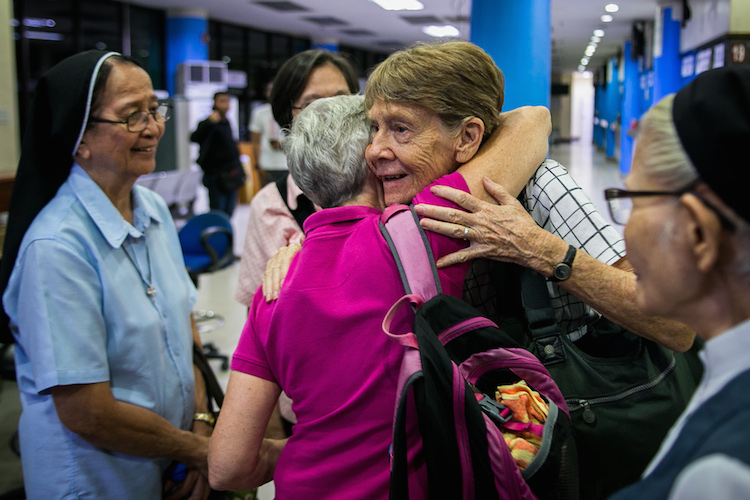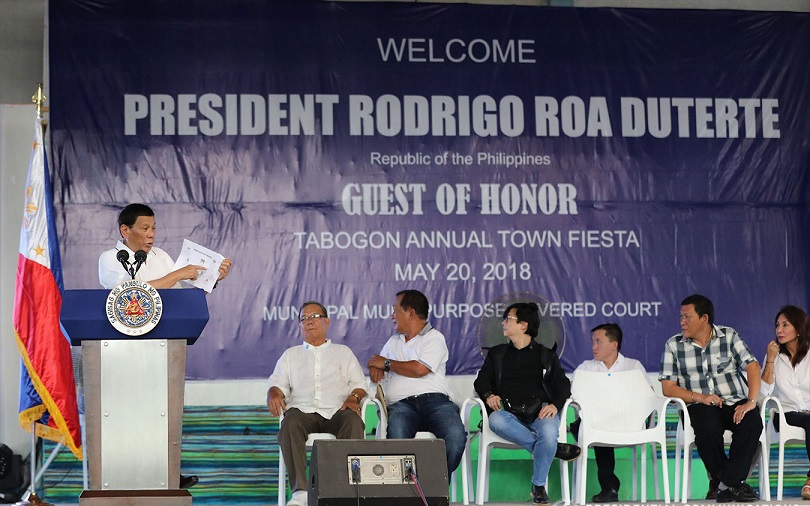
Nuns visit Australian nun Patricia Fox at the immigration
bureau where she was brought after her arrest in Manila. Photo by Mark Z. Saludes
for UCANEWS. Photo used with Saludez’ permission.
The political intimidation suffered by the seventy-one year old missionary worker Sister Patricia Fox at the hands of the Bureau of Immigration reveals two fundamental realities in the Philippines. One, the vicious political reality in the country is displaying authoritarian tendencies by reprehending, intimidating, and sacking all forms of activism and human rights work be it secular or religious. Second, the reality of religious mission makes it clear that religion, contrary to our traditional belief, must concern itself with politics because politics affect man (and the scale of human suffering on account of that) and religion that is “communion with the lord inescapably means a Christian life centered around a concrete and creative commitment of service to others.”
(Update:Justice Secretary Menardo Guevarra on Friday allowed Fox to stay in the country until June 18.)
When a seventy-one year old nun, who has been living in the country for more than twenty-seven years with no record whatsoever of “illegal activities” as imagined by the National Intelligence Coordinating Agency, is hastily taken from her house to be detained in the immigration bureau in Manila, it reveals something of the character of the present administration.
The government has accused Sister Fox of “illegal political activities” by attending a political rally in Tagum City. Jobert Ilarde Pahilga, Sister Fox’s lawyer, denies the accusation. Pahilga confirmed that she was visiting, as part of her missionary work, the farmers and indigenous people in the area. Pahilga continues:“She is a human rights and a genuine agrarian reform advocate who tirelessly provided various social services to farmers including the farmers of Hacienda Luisita.”
Perhaps only in a so-called Christian country like the Philippines is joining a rally considered an illegal activity, while delaying, interrupting, and blocking the enactment of agrarian reform and of ending contractualization and sacking human rights activists are otherwise legal. In no other land is hypocrisy performed so well as in the Philippines.
The charges against Sister Fox confirms the moral instability and paranoia of the administration that anyone who risks to concern his or her self with the plight of the poor is considered an enemy of the state, a “communist” (the favored term of the military) or, as in the case of Sister Fox, an “undesirable alien” (a newly added term to the vocabulary of the inquisitors). Not one’s social status is a guarantee from persecution, whether one is a priest or a seventy-one year old nun or a biochemistry student (remember Josephine Anne Lapira) or a farmer who has never held a gun in his life or an indigenous who has never read a work of Karl Mark– anyone is a candidate for persecution.
But the fate of Sister Patricia Fox is relatively mild compared to the fate of other missionary persons who have been deprived of significant media coverage. Like the fate of Fr. Mark Ventura, a young clergyman of thirty-seven who has been murdered on Sunday morning, April 29, right after celebrating Mass at a gymnasium in Brgy. Pena Weste in Cagayan Province.
The Catholic Bishop’s Conference of The Philippines reports:
“The priest was blessing children and talking with the choir members when a still unidentified male donning a motorcycle helmet emerged from the back of the gym and shot the victim twice.”
Pres. Duterte in a speech during a fiesta in Tabogon, Cebu on May 21 maligned the slain priest by showing a matrix of alleged illicit affairs of Ventura which he said was the possible motive for his murder.

Pres. Duterte respects no occasion. At annual town fiesta of Tabogon, Cebu last May 20 he presented matrix of alleged illicit affairs of Fr. Mark Ventura. Malacanang photo by Valerie Escalera.
It should be noted that only five months ago, December 2017, the seventy-two year old priest, Marcelito Paez, was brutally gunned down. Their killings are directly implied in their active sympathy for the social causes they embraced. Fr. Ventura was known “for his anti-mining advocacies and for helping indigenous peoples in the province.” Fr. Paez’s murder took place right after he “facilitated the release of a political prisoner.” Their cases have yet to be resolved.
What Fr. Paez, Fr. Ventura, and Sister Fox embody is a faith which is fundamentally motivated and inspired by what Fr. Gustavo Gutierrez calls “a spirituality of liberation” which centers “on a conversion to the neighbor, the oppressed person, the exploited social class, the despised ethnic group, the dominated country.” To be converted to the Lord “implies this conversion to neighbor.”
Gutierrez’s monumental work, A Theology of Liberation (1977), which argues that a christian who is converted to the Lord should involve himself “in the world of the poor.” It is in solidarity with the poor and the oppressed in which the Church (or any religion) “should find its identity.”
A radical charity that confronts the injustices of the socio-economic system, a charity that is not afraid to be political, a charity that is a critique of power both in word and in action.
Fundamental to religious life is worship which according to traditional church norm is practiced in dogmatic and ritualistic forms. Worship has never been accorded a proper perspective and a critical role in the religious life. More often than not we think of worship as static, individualistic, sterile, an abstract concept. But worship, in an active and progressive sense, is more than ritualistic, it is a living experience, “when,” wrote Gutierrez, “it is based on profound personal dispositions, on the creation of true fellowship, and on real commitment to others, especially the most needy… Jesus accompanied this criticism with a head-on opposition to the rich and powerful and a radical option for the poor.”
To side with the oppressed peasants and workers, to decry the plight of the poor and the powerless, to denounce injustice is a more subtle and profound form of worship than all the dogmatic and formalistic ones we have learned since.
The example of Fr. Paez. Fr. Ventura, Sister Fox and many others like them is an eminent demonstration of this radical charity and worship grafted into human solidarity.
The problem with our religious life, observed the American philosopher Cornel West, is that “we have little memory or sense of collective struggle and communal combat. At the level of family and individuals, this memory and sense lingers. But at the level of larger social groups and institutions, this memory and sense of struggle evaporates.”
The religious passion of the Filipino people if equipped with a political and historical consciousness has an immense potential to impact social transformation. Because political concerns are not alien to religious existence rather they are linkedby the christian vision of radical love as embodied by that Palestinian Jew named Jesus. The vision is “to preach the universal love of the Father” which implies “to go against all injustice, privilege, oppression, or narrow nationalism.”
Though the workers, peasants, and indigenous communities may not profess their religious faith in outward form they nevertheless reflect in spirit by their struggle the promise and hope of the Gospel.
Judging by this analysis the current and the previous administrations are quite anti-Christian in their responsibility for constructing a “sinful situation” by abandoning the plight of the peasants, workers, the needy and the powerless; by defending and serving the rich and the powerful.
The deaths of Fr. Paez and Fr. Ventura and the ordeal of Sister Fox affirm what it means to be a Christian in a Christian country that violates the most fundamental teachings of the Gospel.
“We must pay a high price for being an authentic church of the poor,” wrote Fr. Gutierrez who worked in the poorest and most violent slums in Peru. “This means frequent attacks on the church and its representatives and, more concretely, the determination to hamper their mission, undermine their reputation, violate their personal freedom, deny them the right to live in their own country, and make attempts against their physical integrity, even to the point of assassination. The experience of the cross marks the daily life of many Christians in Latin America.”
Fr. Gutierrez may well be talking about the Philippines, too.
Carlo Rey Lacsamana is a Filipino, born and raised in Manila, Philippines. Since 2005, he has been living and working in the Tuscan town of Lucca, Italy.